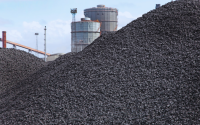31 August 2005Yahoo News
"We have confirmed at least 20 rigs or platforms missing, either sunk or adrift, and one confirmed fire where a rig was," Petty Officer Robert Reed of the Louisiana Coast Guard told AFP.
All of the missing rigs were in the Gulf of Mexico, Reed said citing Coast Guard overflights of the area and information from oil companies.
He could not confirm the location of the blaze but said it would "eventually burn out" and no fire-fighting intervention was needed.
"We are of course working on the environmental side of things but right now we are still concentrating on search-and-rescue missions to save as many lives as possible on land," said Reed, whose own Coast Guard team has been evacuated from the flooded city of New Orleans to Alexandria, Louisiana.
According to the latest tally Wednesday from the federal Minerals Management Service, a total of 561 platforms and rigs have been evacuated in the Gulf of Mexico, which accounts for a quarter of US oil production.
Over 91 percent of normal daily crude oil production in the Gulf -- 1.5 million barrels -- is now shut down, and more than 83 percent of natural gas production, the MMS said.
Among the firms reporting missing rigs was Newfield Exploration Company, which said an aerial survey of its operations in the eastern Gulf showed that one of its platforms at Main Pass 138 "appears to have been lost in the storm".
"As of this morning, boats and helicopters are mobilizing to better access damages, identify any environmental impacts and begin the repair process," Newfield said in a statement.
Noble Corp. said its semi-submersible rig Noble Jim Thompson, which was contracted to a unit of Anglo-Dutch giant Shell, had broken loose and was 17 miles (27 kilometers) adrift of its normal Gulf location.
Shell's giant Mars platform was said by analysts to have suffered "extensive damage".
"Some of our facilities have been damaged and production is halted while we begin assessments and run checks," Shell chief executive Jeroen van der Veer said.
On shore, at least eight refineries have been shut down on the coasts of Louisiana and Mississippi since Katrina roared ashore early Monday just east of New Orleans.
Many other refineries are struggling to cope with shortfalls of crude caused by the closure of major port terminals and pipelines from evacuated and missing rigs in the Gulf of Mexico.
In response, the US government prepared Wednesday to open its emergency oil reserves for the first time in a year to keep supplies running to those refineries still operating.
The United States keeps 700 million barrels of oil stored in four underground salt caverns on the Texas and Louisiana coasts to cushion oil markets during supply disruptions.
The Strategic Petroleum Reserve, which was created during the 1970s oil shocks, was last used after Hurricane Ivan in September 2004, when five million barrels of crude oil were released.
"It's really getting critical in some situations," PFC Energy analyst Seth Kleinman said.
"Until refiners are up and running, and pipelines have power and get product up here, it's looking very precarious," he said.
The government said that Katrina, one of the most powerful storms ever to hit the United States, would have only a "modest" impact on the economy. But analysts were not so sure.
As gasoline prices jumped across the United States, Energy Secretary Samuel Bodman said the White House decided late Tuesday to tap the reserve following a request from the oil industry.
"Last night I approved a company's request for loan from the Strategic Petroleum Reserve. I fully expect that the details of that loan will be released later today," Bodman told a press conference.
Industry analysts expected the oil to be shipped to refineries further west in Texas, which escaped unscathed from Katrina but are now running low on crude supplies because of production interruptions in the Gulf of Mexico region.
At least eight refineries have been shut down on the coasts of Louisiana and Mississippi since Katrina roared ashore early Monday just east of New Orleans.
Many other refineries are struggling to cope with shortfalls of crude caused by the closure of pipelines from rigs in the Gulf of Mexico, where oil production has ground to a virtual halt, and of major ports.
Two of the Louisiana tanker terminals hit by the hurricane -- Port Fourchon and the Louisiana Offshore Oil Port -- combined handle more than 20 percent of all the crude oil imported into the United States.
While additional supplies of oil will be helpful in keeping crude prices from reaching 80 dollars a barrel, the real supply constraints are with refined products made from crude, said Wachovia economist Jason Schenker.
"There is no strategic government reserve of natural gas or refined products, and right now the biggest concerns in the marketplace are for products," Schenker said.
"At the end of the day, it may not matter for gasoline and heating oil prices how much crude comes out of the SPR," he said.
Oil prices have soared to new record highs above 70 dollars a barrel in the hurricane's wake.
The decision to open the US petroleum reserve calmed prices Wednesday, but analysts said the government's move would make little difference and prices could easily rebound.
"It is unknown how extensive the damage to the refineries is," said Tony Nunan, manager for energy risk management with Mitsubishi Corp's international petroleum business in Tokyo.
"If you don't have enough refining capacity, it doesn't help you with the crude oil," he said.
But Ben Bernanke, chairman of the Council of Economic Advisers in the White House, said opening the reserves would help companies "produce more gasoline and help alleviate some of the shortages".
Speaking on the CNBC network, he acknowledged that times were "tough" for US consumers and businesses as petrol pump prices shoot up even more as a result of Katrina.
"My guess is though that as long as we find that the energy impact is only temporary, and there is no permanent damage to the infrastructure ... the effects in the overall economy will be fairly modest," he said.
Philadelphia Federal Reserve president Anthony Santomero said the effects of Katrina were likely to impede but not halt the economy.
"The US economy has proven to be surprisingly capable of absorbing such shocks, and after a short period, the effects of Katrina are likely to slow but not stall the forward progress of the national economy," he said.
Several economists, however, fretted that Katrina could hurt growth in the third quarter to September.






